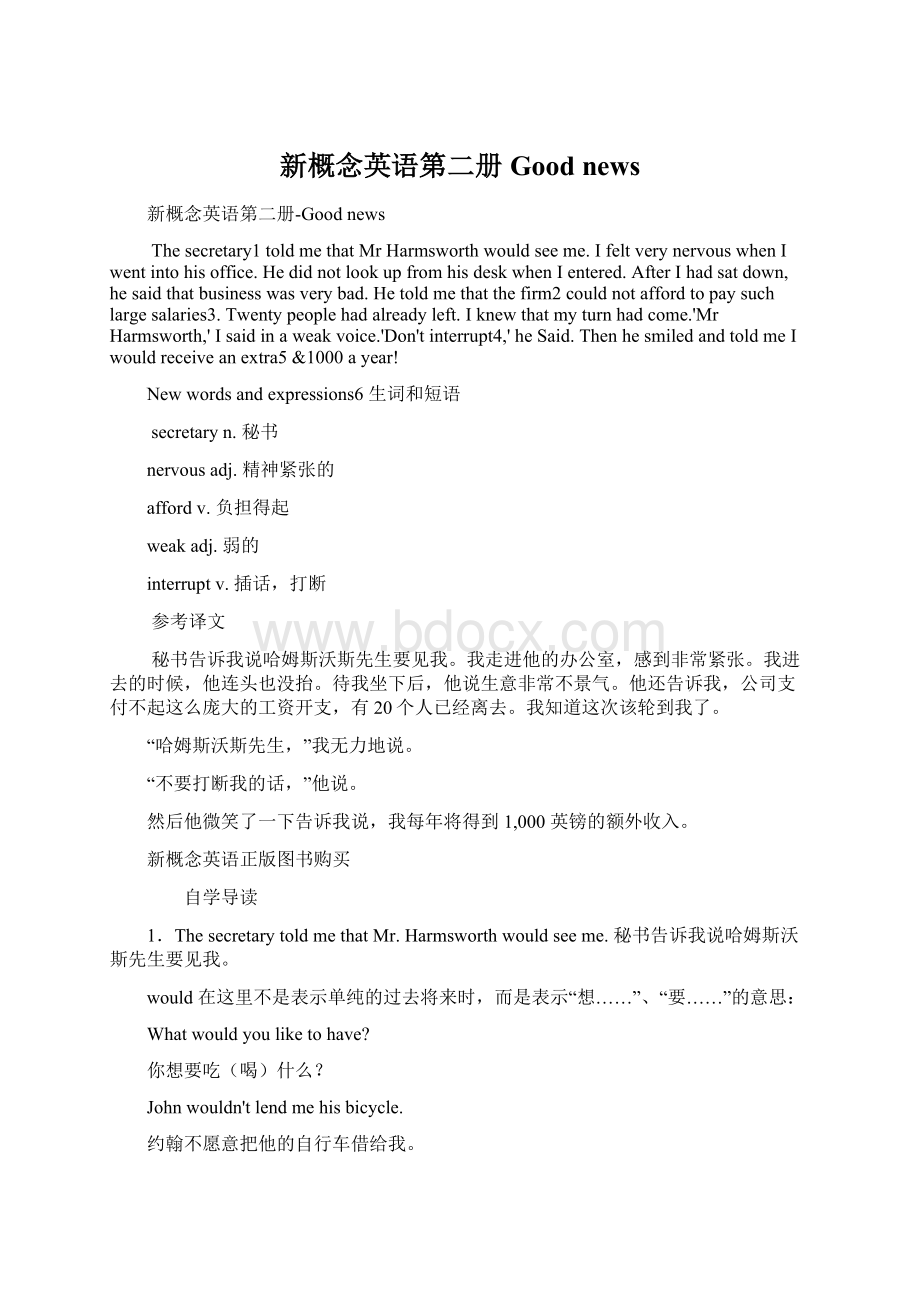新概念英语第二册Good news.docx
《新概念英语第二册Good news.docx》由会员分享,可在线阅读,更多相关《新概念英语第二册Good news.docx(8页珍藏版)》请在冰豆网上搜索。

新概念英语第二册Goodnews
新概念英语第二册-Goodnews
Thesecretary1toldmethatMrHarmsworthwouldseeme.IfeltverynervouswhenIwentintohisoffice.HedidnotlookupfromhisdeskwhenIentered.AfterIhadsatdown,hesaidthatbusinesswasverybad.Hetoldmethatthefirm2couldnotaffordtopaysuchlargesalaries3.Twentypeoplehadalreadyleft.Iknewthatmyturnhadcome.'MrHarmsworth,'Isaidinaweakvoice.'Don'tinterrupt4,'heSaid.ThenhesmiledandtoldmeIwouldreceiveanextra5&1000ayear!
Newwordsandexpressions6生词和短语
secretaryn.秘书
nervousadj.精神紧张的
affordv.负担得起
weakadj.弱的
interruptv.插话,打断
参考译文
秘书告诉我说哈姆斯沃斯先生要见我。
我走进他的办公室,感到非常紧张。
我进去的时候,他连头也没抬。
待我坐下后,他说生意非常不景气。
他还告诉我,公司支付不起这么庞大的工资开支,有20个人已经离去。
我知道这次该轮到我了。
“哈姆斯沃斯先生,”我无力地说。
“不要打断我的话,”他说。
然后他微笑了一下告诉我说,我每年将得到1,000英镑的额外收入。
新概念英语正版图书购买
自学导读
1.ThesecretarytoldmethatMr.Harmsworthwouldseeme.秘书告诉我说哈姆斯沃斯先生要见我。
would在这里不是表示单纯的过去将来时,而是表示“想……”、“要……”的意思:
Whatwouldyouliketohave?
你想要吃(喝)什么?
Johnwouldn'tlendmehisbicycle.
约翰不愿意把他的自行车借给我。
2.HedidnotlookupfromhisdeskwhenIentered.我进去的时候,他连头也没抬。
在这句话的lookup中,look是它的本义“看”、“瞧”。
lookup一般表示原先在埋头干什么之后抬头看:
Helookedup(fromhisbook)whenheheardanoise.
他听到声音后就抬起了头。
(原先在读书)
3.Iknewthatmyturnhadcome.我知道这次该轮到我了。
turn在这里是名词,意为“轮流”、“轮班”、“(依次轮流时各自的)一次机会”:
Ihavealreadyaskedtwoquestions.Nowit'syourturn.
我已经问了两个问题。
该轮到你了。
Whenhisturncame,hecouldn'tspeakanyword.
轮到他时,他却一个字也说不出来。
4.‘Mr.Harmsworth,’Isaidinaweakvoice.“哈姆斯沃斯先生,”我无力地说。
weak在这里不是指身体虚弱,而是指声音“微弱”、“无力”,因为怕被开除而感到紧张。
5.ThenhesmiledandtoldmeIwouldreceiveanextrathousandpoundsayear!
然后他微笑了一下告诉我说,我每年将得到
1,000英镑的额外收入。
(1)extra表示“额外的”、“外加的”、“份外的”:
OnSundays,Iusuallygetsomeextrasleep.
星期天我通常要多睡一会儿。
Lastmonth,hewaspaidanextrahundredpounds.
他上个月多得了100英镑。
(2)a在这里可译为“每一”:
IwenttoLondononceamonth.
我每月去一次伦敦。
Jack7telephonedPaulinefourtimesaday.
杰克每天给波琳打4次电话。
语法Grammarinuse
间接引语(Indirectspeech)
把某人所说的话告诉另外一个人时,应该使用间接引语(有的语法书称之为“转述引语”)。
引述动词(如say,tell)可能是现在时,也可能是过去时(最常用)。
间接陈述句的时态往往受引述动词的影响。
引述陈述句时最常用的动词是say和tell。
它们之间的区别是tell后面必须跟表示人称的间接宾语(tellsb….),而say后面则可跟或不跟to+讲话对象。
如果需要提到听话者,tell+间接宾语通常比say+to+sb.更常用。
在say和tell后面一般不可加逗号。
如果间接引语中的引述动词是现在时,那么其后的时态通常与原来口头陈述句的时态相同。
转述刚刚说完的话时通常如此;引述动词如果是过去时,那么间接引语中的时态通常要“往回移”(即“倒移”)。
一条普遍的规则是“现在时变为过去时,过去时变为过去完成时”。
直接引语:
‘Icanseehimnow!
’
“我现在能够见他!
”
词汇学习Wordstudy
1.nervousadj.
(1)神经质的,神经紧张的:
Sheisanervouswoman.Doyouseethatnervoussmileonherface?
她是个神经质的女人。
你看见她脸上那种神经质的微笑了吗?
(2)紧张的,担心的,情绪不安的:
Ifeelverynervousbeforeexams.
我在考试前感到非常紧张。
Hehadneverspokeninpublic,sohewasverynervous.
他从未当众讲过话,所以他非常紧张。
(3)与nervous容易混淆的另一个词是irritable8(易怒的,急躁的):
Ourteacherisanirritableoldlady.Shegetsangryeasily.
我们的老师是位脾气急躁的老太太。
她很容易生气。
2.affordvt.
(1)买得起(常与can连用):
Wecan/can'taffordacarthisyear.
我们今年买得起/买不起小汽车。
(2)担负得起(损失、后果等),花得起(时间)(常与can连用):
Ican'taffordtobeillagain.
我不能再病了。
Icanonlyaffordoneweekforthetrip.
我只能为这次旅行抽出一周的时间。
(3)提供,给予:
Joeaffordedusaroomforthenight.
那天晚上乔为我们提供了一个房间过夜。
练习答案Keytowrittenexercises
1.关键句型练习答案
A1aThesecretarytoldmethatMr.Harmsworthwouldseeme.
b‘Mr.Harmsworthwillseeyou.’
2aMr.Harmsworthsaidthatbusinesswasverybad.
b‘Businessisverybad.’
3aMr.Harmsworthtoldmethatthefirmcouldnotaffordtopaysuchlargesalaries.
b‘Thefirmcannotaffordtopaysuchlargesalaries.’
B1told…wouldcome/wouldbecoming
2said…(had)cut
3told…hadneverplayed
4didhesay…haddone/woulddo
5didhetell…(had)bought/wouldbuy
6said…couldnot
7said…(had)worked
8told…wrote/writes/hadneverwritten
9didyousay…were/hadbeen
10said…wouldwait
2.难点练习答案
1study2office3nervous4afford5irritable
3.多项选择题答案
1d2b3c4b5c6d
7a8d9c10c11c12b
【Newwordsandexpressions】生词和短语
★secretary n.秘书
history
secret
★nervous adj.精神紧张的
benervous
worried:
为以后的事情担心
upset:
不安的
★afford v.负担得起
affordsth.
Icanaffordthehoilday.有时间去
affordmoney/time
affordtodosth.
Icanaffordfiveyuan./Icanaffordthebook.
/Icanaffordtobuythebook.
★weak adj.弱的
★interrupt v.插话,打断
(n.)interruption
disturb9:
打扰某人
interrupt:
打断某人的话
Sorryto...
课文讲解】
lookdownupon10/onsb:
瞧不起某人
Ilookdownuponmysister.
Ilookdown往地上看
Thefirmcouldnotaffordtopaysuchlargesalaries.
collectsalary11领薪水
paysalary支付薪水
so的后面加形容词或副词
such的后面加名词,容许在该名词前面加修饰词
所有的间接引语都是宾语从句
Myturnhascome.
Itismyturn.轮到我了
ina...voice
inaloud(大声)/low(低声)/weak(心里不踏实)/strong(理直气壮)voice
ayear
anextrathousand
再有多少:
数量+extra+名词
twoothers
twomore/oncemore
anotherthreedays
Keystructures】
间接引语
一、主从一致:
主句和从句的时态一致
1.主句的动词为一般现在时,从句为任意时态
2.主句的动词为一般过去时,从句为相对应的过去时态
(过去时:
一般过去时,过去实行时,过去完成时,过去将来时)
一般现在时—— 一般过去时
现在实行时—— 过去实行时
现在完成时—— 过去完成时
将来完成时—— 过去将来完成时
一般过去时—— 过去完成时
二、人称变化
主要是第一和第二人称变化,设身处地
三、只要属于宾语从句,引导词that考研省略
ExercisesB
后面有"人"用tell,否则用say
1.told;wouldcome
2.said;hadcut
3.told;hadneverhad
4.did; say;haddone/woulddo/did
5.did; tell;hadbought
6.said;couldn't
7.said;hadworked
8.told;hadneverwritten
9.did; say;werebusy
10.said;wouldwait
先根据原句填时态,再把这句话放到整篇文章中检验
【Specialdifficulties】
office:
办公室
study:
书房
desk:
课桌
exercises
1.study
2.office
3.nervous
4.afford
5.irritable
【Multipechoice】
6.....d...
(书面语)myturnhascome,(口语)itismyturn
轮到谁:
whoseturn(isit)?
whoisnext?
10...c...
It'syourturn.You'renext.
12....
extra,other,more,another
最灵活的是more,twomoreeggs,oncemore
more能够放数词和名词之间,甚至能够放在整个名词的后面
extra和other一定放在数词和名词之间,another一定放在数词前面
oversth:
超过(多余)什么东西,overthreeyears
up:
往上,climbup
【Grammar】
一般过去实行时:
跟过去的一个时间或动作同时发生
间接引语
如果是现在实行时在直接引语当中变成间接引语,极有可能选用过去完成时
1.Mybrother____whilehe____hisbicycleandhurthimself.
A.fell/wasriding B.feel/wasriding
C.hadfallen/rode D.hadfallen/wasriding
fell(跌下来),ride(骑自行车) A
2.He____hislegashe_____inafootballmatch.
A.broke/played B.wasbreaking/wasplaying
C.broke/wasplaying D.wasbreaking/played
breakone'sleg C
3.Myfatherwillbeheretomorrow.
Ithoughtthathe____today.
A.wascoming B.iscoming
C.willcome D.comes A
becoming表示将要
go/come/leave/arrive的过去实行时态很有可能表达过去将来时态的含义
跟go/come/leave/arrive相连的词一定会用实行时态表示将来时态
4.Jackwasgoingoutoftheshopwhenhecollided13withanoldwoman
who____
A.come B.wascoming
C.hadbeencoming D.hadcome
collide12:
相撞,是相对概念 B
5.Mikecouldn'tcometothetelephonewhenMr.Smithcalledherbecause
she___C__inthelab.
A.hadbeenworking B.hasbeenworking
C.wasworking D.worked